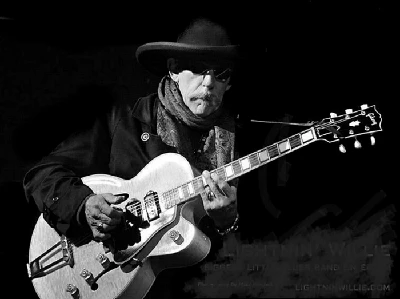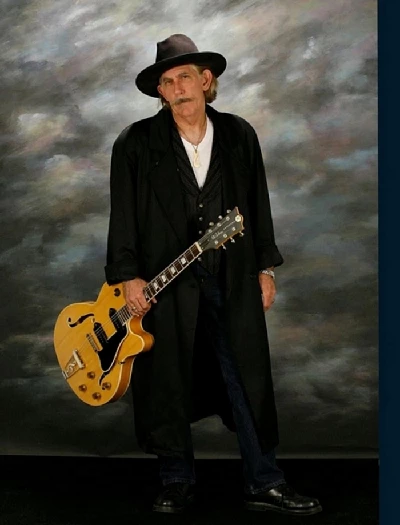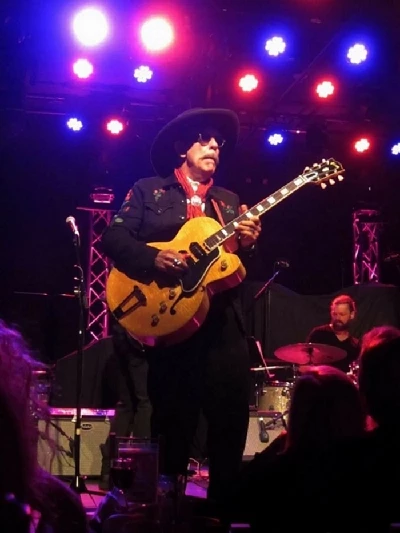published: 16 /
7 /
2020

In this archival interview from 2010, Nick Dent-Robinson talks to legendary bluesgrass musician Lightnin' Willie about his band the Poorboys, encounters with Jimi Hendrix, Muddy Waters and Eric Burdon, and his love of touring and the UK.
Article
Lightnin' Willie and the Poorboys are one of the most authentic yet accessible bluegrass and blues-influenced bands to regularly tour the UK. Originally from Texas but now living in Southern California, Willie is a highly accomplished, versatile guitarist, vocalist and songwriter. He's appeared with some of the legends of American music – like Willie Nelson and Bob Dylan - and has encountered many more musicians along the way -from Muddy Waters to Jimi Hendrix to BB King as well as the UK's Eric Burdon, Robert Plant, Mick Taylor and Keith Richards. Plus Willie has written music for major Hollywood movies and TV.
In the USA, Lightnin' Willie and the Poorboys are known as one of the hardest working and most travelled bands, renowned for the great performance they are guaranteed to give. They've released many albums and tour the States almost non-stop for most of the year, playing mainly original material to full houses. They have done this for decades. But each summer Willie brings his music to Europe and the UK, working with some of the finest British musicians. His stylish combination of powerful blues, rich vocals and brilliant, high-energy guitar-work, has every audience on its feet. Indeed, so passionate are some supporters that they now pursue Willie around the country. The band's 2010 UK tour dates include the Royal Albert Hall as well as many smaller venues throughout the UK including Woodstock...the original Woodstock, near Oxford.
During a rare afternoon of relaxation in the Chiltern Hills, Lightnin' Willie talks to Nick Dent-Robinson about his passion for blues music, his decades on the road and some of the things he's learned along the way.
Willie and I meet amidst the lush green tranquility of the Oxfordshire countryside. It is such an English scene that it seems incongruous to meet an archetypal American blues man here. Yet Willie is clearly very much at home, even if he is wearing his trademark black Texan cowboy hat. “I know it is a very American thing to say, but I do love England,” Willie assures me with a broad grin. “You see, my step-dad worked with the US forces and a lot of my young days were spent travelling overseas with my mom and him. I've been visiting England since the early 1970s. It's like a second home to me.”
Did those early years of living in foreign countries, experiencing different cultures, influence Willie's taste in music?
“It sure did. But my love of the guitar began way before that. I was born in Dallas and initially raised in Texas in a small town called Arlington. There was a lot of Mexican influence there and Mexican music. After my dad had left us when I was still very young, my mom and I used to visit Mexico where she would teach farmers English whilst improving her Spanish. And in one of the little Mexican towns we'd stay, there was a plaza where a lot of little old men would just sit in the shade, drinking tequila and playing guitar. They'd have no teeth, wizened faces and cheap old guitars but they played so beautifully. I found it mesmerizing. It inspired me."
“And then we went to Mexico City one time and some friends bought me an $8 Spanish guitar. They taught me chords so I could play a few things like 'La Cucharacha', 'La Bamba', 'Tom Dooley'. And that was me started."
“Then my mom and I moved to California, then back to Texas and on to Florida. All the time I am learning guitar. After my mom remarried, we went with my stepdad's job to live in Ankara, Turkey and then to Berlin in Germany. By the time we'd reached Ankara I was playing electric. A Sears Roebuck 'Silver Tone' with the amplifier in the guitar case. I still have it. In Ankara there wasn't much Western music back then. But the very different sounds of Turkish music were fascinating to me. I put together a little band at the base, my first ever band, just to keep some of us kids amused.”
There would be more western music in Berlin?
“Berlin was much better. A lot of big music names would visit and we'd get to see them just for a few dollars. I saw more people there than I ever could have back in the USA. I remember the Beach Boys, Manfred Mann, Spencer Davis, Ray Charles, the Kinks and the Small Faces with Steve Marriott. But one of my best moments there, was on May 27th 1967 at the Neue Welt club when I met Jimi Hendrix. I still have a photo I took of Jimi performing that day; we were just a yard or so away, right in front of the stage and he was amazing. He was putting on a show for us kids at the front, I think. You know, doing things to shock us, skidding across the floor on his knees and so on. After the show we met two of his band and they took us to see him. He was good with us, a nice man. And that performance, that night, it made me determined to delve in deeper to music. To learn to play guitar as cool and confident as Jimi did.”
Was blues music Willie's biggest influence?
“It sure was – along with country and bluegrass. I'd already been exposed to blues. My mom introduced me to all kinds of music including many bluegrass and blues players. And my stepdad worked with the US forces and he and my mom were friends with an African American army sergeant who'd given me reel-to-reel tapes of people like Muddy Waters, Chuck Berry, Howlin' Wolf, which I thought was so cool. Still do. Then one day I met Muddy Waters. A man called Zaven Zambazian (known as 'Big John') who was a great harmonica player took me to meet a host of blues greats – including Muddy. I remember Muddy was very gracious to me. Over the years I met him many times and got to hang out with him a little. The guys in his band - like his great guitarist, 'Pee Wee' Madison - taught me a lot of things."
“Once in L A when Muddy was playing the Ashgrove, a famous little blues club, I saw Eric Burdon of The Animals in the audience there. I asked Eric if he'd like to meet Muddy but he said, 'I can't get in there'. So I said, 'Follow me' and I led Eric straight upstairs holding my guitar up high because back then carrying a guitar was like a free pass to any gig. We met Muddy and Robin Ford, the guitar player, who was actually playing saxophone that night. Then Eric came down and joined our table. It was an amazing night."
“Another time I met Eric at the Whisky a Go Go club in Hollywood. Johnny Weider and Ron Chapwood were there with this other guy I didn't recognise. I asked Johnny if I could play his guitar and he said, 'Sure'. Suddenly the other guy I don't recognise starts singing as I play and Eric Burdon and people are all clapping and cheering. Then, as I leave to go home, the girl I'm with is going crazy...'Wow, you just played with Robert Plant.' I knew Led Zeppelin but, being more into blues than rock, I hadn't recognised Robert...he was the guy who was singing as I was playing."
“After that Eric Burdon invited me to audition for a new band he was putting together following the New Animals breaking up. But the band never happened. Eric decided to make a movie instead. Just last year he was playing at the Edinburgh Festival the day before I was playing there. So our paths didn't quite cross. I'd have loved to meet him again. Eric Burdon is still a phenomenal performer. He sings with such power and passion. The Animals were inspirational for me.”
Who were the other musicians who Willie most admired?
“There are many. From those Mexicans in my childhood to now, I've learned from others along the way. My music has country and bluegrass influences but it is rooted in blues. So it is people like Muddy Waters, Robert Johnson, Chuck Berry, Howlin' Wolf who were big early influences. I met BB King and he showed me a lot too. But I had broad tastes and also loved the Beatles. George Harrison was a great guitarist, you know. And I was always a big fan of the Stones, especially Keith Richards' playing. Over time I've met Keith and Mick Taylor and Ronnie Wood. I really appreciate their early work; that stuff was really jamming. I loved Bill Wyman's cool approach, sitting there casually playing with a quiet smile on his face amid all that pandemonium. But I have learned so much from so many people; I am still learning. My foundation is blues so it is blues people who have been my biggest influence.”
Where did the name, “Lightnin' Willie and the Poor Boys” come from?
“Howard Stern, the original American radio “shock jock” was responsible for that. He's in New York City now but at that time he was with a station in L A. There was the Creedence Clearwater Revival album, 'Willie and The Poor Boys'. A song on the album, 'Down on the Corner', is about a fictional band busking on a corner for nickels. Back then my band and I used sometimes to busk in the street in Old Town Pasadena. Howard would see us there and talk on air about us...telling people to go down town to see us...'They're down there, Willie and the Poor Boys,' he'd say. And people came. They believed we were the band in the CCR song. And our harmonica player always used to call me Lightnin' Willie because I could play some of my guitar licks real fast. So we put those things together and became Lightnin' Willie and the Poor Boys.”
Are there differences playing in the UK and Europe from touring in the USA?
“Not many. And I play the same here as there. The musicians in the UK are really good. For my present tour - I call it the No Black No White Just Blues tour - I am supported by Giles King on harmonica, Paul Birch, known as 'Nobby', on drums and Aaron McRobbie on fender bass. They are excellent players and we work well together...it's almost an instinctive thing. It is important to me to put on a great show – with style. I insist on having good lighting and looking smart. I am not a yee-haw but I wear my big Texan hat, I press my pants and polish my shoes. The amplifiers, my guitar, everything, has to be immaculate. The way I look at it is, people are paying their money and taking time out of their lives to see me so it's only right for me to go to the trouble of looking and sounding good. Presentation, dynamics, courtesy is important. And be nice to everybody. This way people are glad to see you return; they remember you.”
What other advice does Willie have for younger musicians?
“To just know that drugs or too much drink can badly affect your music. Like many of my generation I was involved in all that. But then, over 20 years ago, I straightened myself out. If you are a good musician, the only drug you ever need is the music...playing live and making people happy. There's no better high than that."
“I'd also say, learn how to read and write music. I started playing by ear, learning chords, learning by listening to records. But in my twenties I went off to music college and everything got better then. I learned to write and arrange for a piano, for brass or strings. In the studio when we are recording one of my compositions I can say to the sax player or the pianist...'This is your part...' and show them the score of what I want them to do. It's a really useful thing. So that would be a big recommendation...make the effort, take the time and study music properly.”
The ability to write and arrange must have helped when Willie was writing music for movies and TV?
“It always helps. My music and songs have been used in quite a few TV shows. And I've had music in a Lou Diamond Phillips movie and in 'The Final Cut', a 2004 movie with Robin Williams and Mira Sorvino. And in others, too. I took my mom to see one of the movies my music was in and then at the end, there's the music credits...'such and such by Johann Sebastian Bach, such and such by Wolfgang Amadeus Mozart and then whatever it was by William Kenneth Hermes'. My mom turned to me, tears in her eyes and just said, 'Kid, the billing don't come much better than that.' I got such a kick out of that.”
Looking back, who do you owe the most to?
“No question, my mother and my wife Jeannie. My mom always wanted me to do what made me happiest. She always believed in me and backed all my choices and decisions. And my wife Jeannie has been the greatest support. Incredible, really. She's a school teacher and is always there for me, showing tolerance and understanding and paying the bills if we hit difficult times. I couldn't ask for more.
“I also owe a lot to the musicans who I've learned from over the years and those who've supported me. Including some I've had to part company with as I've progressed...the ones I've had to leave behind along the way. Plus the people who encourage me. Recently I've been working with Pete Anderson – the multi-platinum, Grammy Award-winning producer, writer, band leader and great guitarist. He's worked with Roy Orbison, Lucinda Williams, Dwight Yoakam, so many people. Pete has produced me and he's been playing with me. It means a lot to me to work with someone of Pete's prowess. Pete has given me a great boost at this time in my life and I'm very grateful for that."
“And I owe a debt to the audiences who have supported me and enjoyed my music over the years. When people applaud and cheer and stand for you....wow, that means a lot. One day on last year's UK tour, at the end of the show, a woman passed me the eulogy from her husband's funeral that she'd written. She'd used words from one of my songs. That meant so much. You know, I went straight out there on my own without the band and just sang her that song with my guitar. I had tears in my eyes. It's a potent feeling when you know you've touched someone so much with your writing. There's not many jobs in the world that can give that kind of satisfaction. But music can do it. Moments like that matter to me far more than fame or fortune.”
Band Links:-
https://www.lightninwillie.com/
https://www.facebook.com/Lightnin-Will
https://twitter.com/lightninwillie
Picture Gallery:-

